World
Israel Hamas war: European Parliament calls for 'permanent ceasefire'
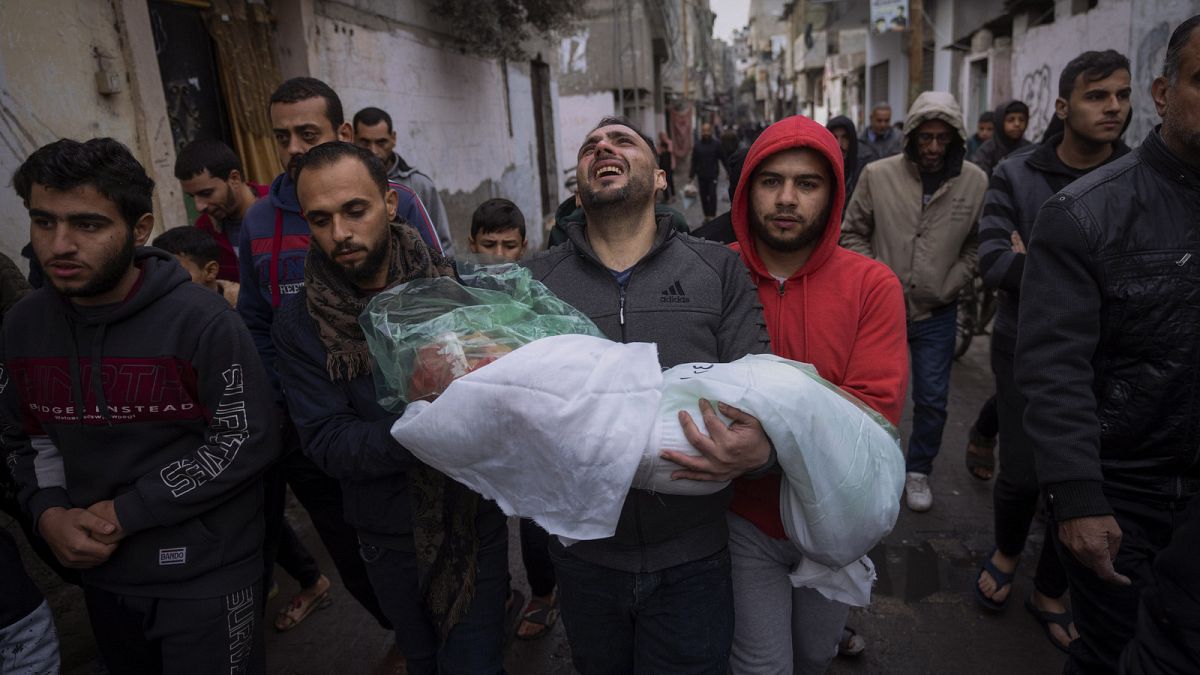
The European Parliament has for the first time called for a “permanent ceasefire” in Gaza and the start of political efforts to find a solution to the war between Israel and Hamas.
The resolution, which is purely symbolic and carries no legal weight, was approved with 312 votes in favour, 131 against and 72 abstentions in Strasbourg’s plenary chamber on Thursday after a compromise was made to appease centre-right lawmakers.
The ceasefire plea represents a significant shift in the Parliament’s previous position, agreed in October, which called for a humanitarian “pause” to step up the flow of aid reaching Gaza’s civilians. That vote in October had passed with 500 votes in favour, 21 against and 24 abstentions.
Thursday’s sharpened call comes as the Gaza death toll tops 24,000, according to the Hamas-run health ministry, since the start of the Israeli offensive.
While the hemicycle’s left-leaning and centrist groups had openly backed the ceasefire call, members of the centre-right European People’s Party (EPP), the largest group in the chamber, had expressed reservations.
An amendment specifying that the ceasefire should be conditional on the release of all hostages held in Gaza and the “dismantling” of Hamas, which is designated a terrorist organisation in the EU, secured the backing of EPP lawmakers.
“Sustainable peace cannot exist as long as Hamas and other terrorist groups hijack the Palestinian cause and threaten the existence of Israel, the only democracy in the region,” Antonio López-Istúriz, an EPP lawmaker, said at the plenary.
Responding to the resolution, a representative of the Israeli mission to the EU told Euronews that it shows the Parliament “has an understanding of the cause of the war and the means to end it.”
“We are pleased that the resolution states clearly that a ceasefire is provided upon the unconditional release of all hostages and the dismantling of the terrorist organization Hamas,” the representative added.
EU lawmakers also condemned Israel’s “disproportionate” military response in Gaza and supported a European initiative to resume the so-called two-state solution, a long-term diplomatic solution which would secure statehood for the Palestinians.
Several versions of the text and dozens of amendments were filed in anticipation of the vote, reflecting the variety of viewpoints across the hemicycle.
In a sign of the difficult political wrangling that was needed to get the resolution over the line, Hilde Vautmans, a Belgian MEP for the liberal Renew Europe group, urged the hemicycle to find unity after hours of negotiations over the past few days.
She said ahead of the vote that the EU’s “international credibility” was at stake.
Bruno Lété, senior fellow at the German Marshall Fund, told Euronews that although purely symbolic, calls from EU and world leaders can have an effect.
“We’ve seen (…) some EU leaders, leaders in the Arab world, and even close allies of Israel such as the United States, calling on Israel to show more restraint in its actions in Gaza,” Lété explained. “I think partially it works. We’ve seen Israel now withdrawing partially from the Gaza Strip.”
But, Lété added, the condition of eradicating Hamas from the Gaza Strip will be difficult to fulfil, and that both warring parties would need to comply with a ceasefire agreement.
“We’ve already seen statements by Israeli officials saying that (…) we are satisfied with the level of eradication of the network in Gaza,” he said. “But we also see reports, showing that Hamas is actually returning to some of the areas that Israel supposedly had under control.”
“If Hamas doesn’t comply, it leaves little choice to Israel then to return to to its action. So both parties have to show a certain willingness to work towards a ceasefire,” he went on.
The European Council, which represents the bloc’s 27 member states, has not yet unanimously agreed to call for a ceasefire, despite pleas from countries such as Belgium, Ireland and Spain. So far, their official line is “humanitarian pauses and corridors,” a wording that implies a temporary, rather than continued, interruption of hostilities.
A European Council summit in December ended with no new conclusions on Gaza, despite seventeen EU member states, a majority of the bloc, backing a United Nations General Assembly resolution calling for a humanitarian ceasefire just days earlier.

World
Hamas kingpin holed up deep below Gaza, surrounded by hostages used as human shields, says expert
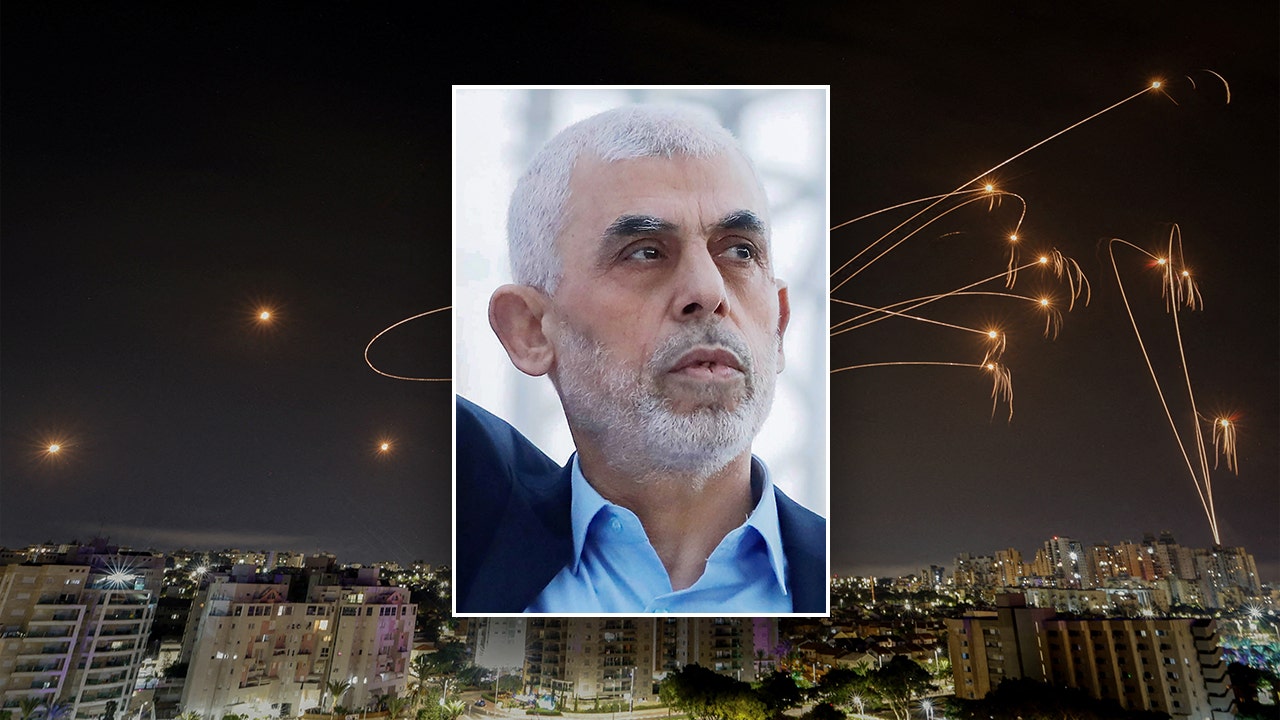
JERUSALEM – The terrorist mastermind behind Hamas’ massacre of nearly 1,200 people, including over 30 Americans, is believed to be using hostages as human shields to hold off Israeli soldiers seeking to capture him in a tunnel deep below Gaza.
The shocking information about Hamas kingpin Yahya Sinwar was revealed by Gen. Jack Keane, FOX News Channel senior strategic analyst and former U.S. army vice chief of staff, in an interview with Sky News Australia on Thursday.
Hamas terrorist leader Yahya Sinwar speaks to a crowd. (Majdi Fathi/NurPhoto via Getty Images)
“My sources tell me that Sinwar, who is the number one leader in Gaza of the Hamas organization, has 15-20 hostages protecting him and his family,” Keane said. “That’s why they have these hostages, to guarantee their survival. Israel is absolutely right in putting military pressure on them to force the release of the hostages.”
Keane’s revelation coincides with statements by Israel’s national security adviser, Tzachi Hanegbi, in an interview with Israeli news outlet Channel 12 on Saturday that Israel Defense Forces (IDF) nearly killed Sinwar. Hanegbi said Sinwar “is living on borrowed time,” and that “he won’t emerge alive from this confrontation.”
Israel is offering a $400,000 bounty for the capture of Sinwar. In December, Israel dropped leaflets on Gaza offering rewards for information about the location of Hamas’ top leadership.
Hanegbi said the IDF was close to killing Sinwar over the last few months. “It is apparently hard for [Sinwar] to make a decision [regarding a hostage agreement] that is likely to mean the end of Hamas rule,” noted Hanegbi, who added that “because the minute he gives up on the highly significant card for his survival, our hostages, it’s not easy for him, and that’s why things are delayed.”
UN, HUMAN RIGHTS, MEDIA GROUPS RELY ON HAMAS DEATH TOLL IN ‘SYSTEMATIC DECEPTION’: EXPERT
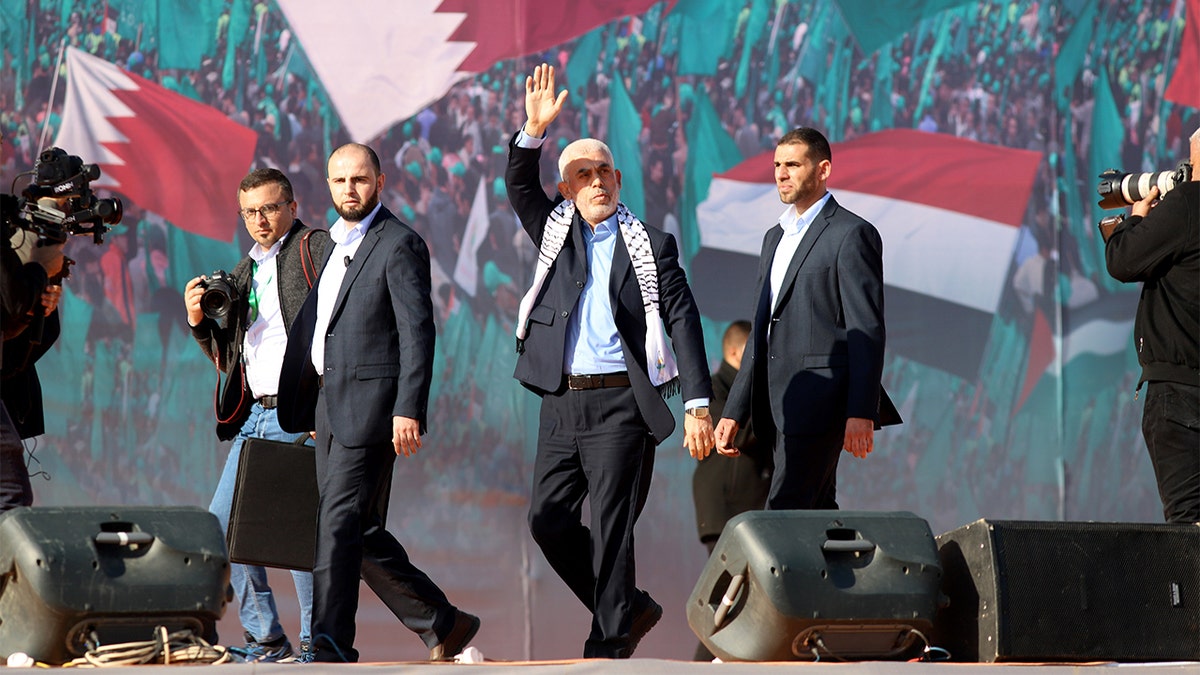
Terrorist leader Yahya Sinwar waves during a rally. (Rizek Abdeljawad/Xinhua via Getty Images)
The citizenship composition of the hostages being used by Sinwar – in violation of international humanitarian law – is unclear. Five Americans are believed to be among the more than 100 hostages held by Hamas.
Hamas invaded Israel on Oct. 7, 2023, and as part of its slaughter of roughly 1,200 people, the terrorist group took over 200 hostages into Gaza. A November hostage deal secured the freedom of more than 100 hostages, mostly women and children, in exchange for Israel’s release of dozens of Palestinian terrorists.
Israel’s Prime Minister Benjamin Netanyahu has announced a military operation into Rafah – the last major city controlled by Hamas and where Sinwar is believed be hiding with his hostages. Israel’s security objective is also to destroy the tunnels between Egypt and Rafah that enable Hamas to smuggle in weapons.
WORLD HEALTH ORGANIZATION SILENT OVER HAMAS’ USE OF GAZA HOSPITAL AS TERROR HQ
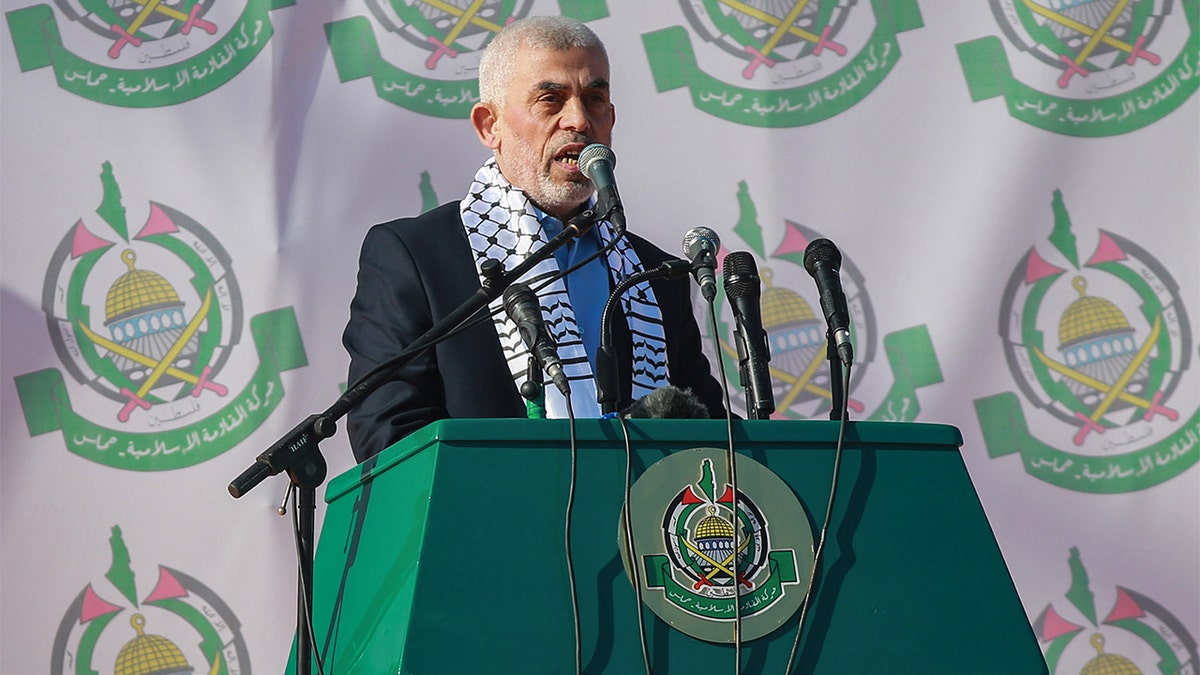
Israel is offering a $400,000 bounty for the capture of Yahya Sinwar. (Mohammed Talatene/picture alliance via Getty Images)
The Biden administration has thus far opposed Israel’s war plan to defeat Hamas in Rafah because of concerns of civilian deaths.
Hamas retains four battalions in Rafah coupled with thousands of terrorist fighters. While the Rafah operation looms, complex negotiations are unfolding in Cairo and may slow the pace of Israel’s efforts to root out Hamas terrorists in the city populated with more than a million Palestinians.
David Wurmser, a former senior adviser for nonproliferation and Middle East strategy for former Vice President Dick Cheney, said about Sinwar’s use of hostages that “the holding of hostages – since he values their lives nil – is nothing more than, say, a soldier taking cover behind a tree or rock when under heavy fire. It is not cowardice, but an intelligent and primordial impulse. He has no more empathy for a hostage than a soldier does for the rock. Indeed, the same with the ‘innocent’ Palestinian civilians.”
UN, HUMAN RIGHTS, MEDIA GROUPS RELY ON HAMAS DEATH TOLL IN ‘SYSTEMATIC DECEPTION’: EXPERT
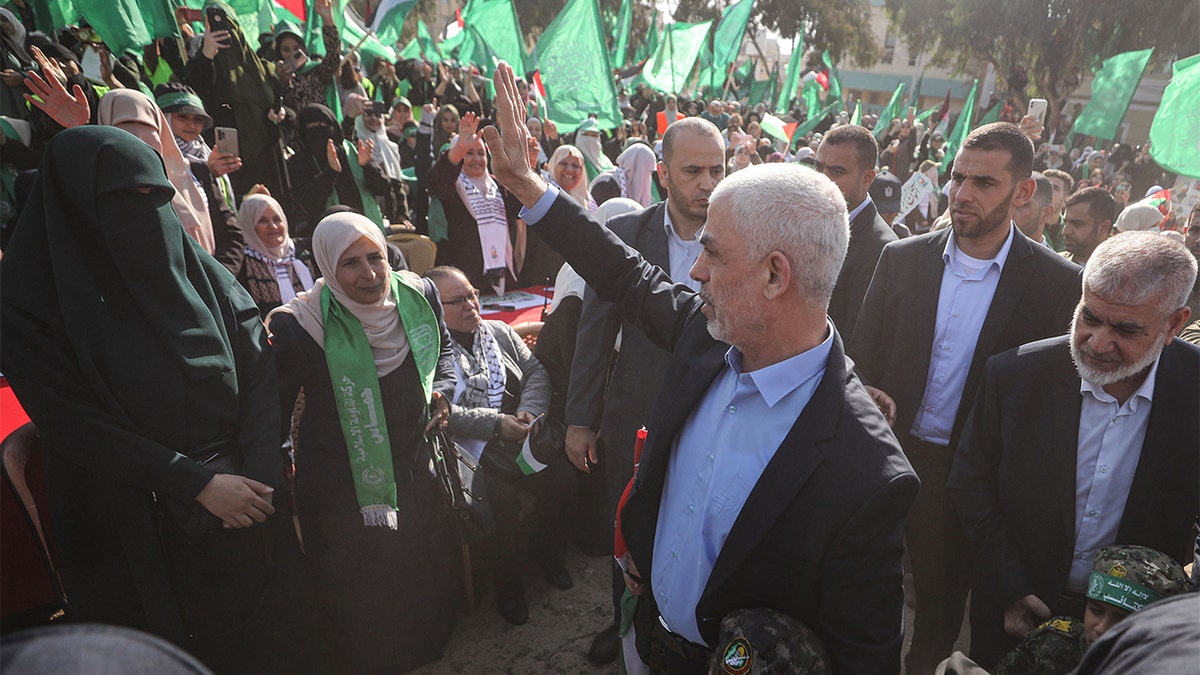
An Israeli official said the IDF was close to killing Sinwar over the last few months. (Mustafa Hassona/Anadolu Agency via Getty Images)
“All is part of a very sober and rational strategy. And given the amount he has taken control of Israeli and U.S. policy with hostages and human shields, it’s a very rational strategy,” Wurmser added. “We consider it cruel – but that requires empathy, which he is devoid of, and immoral, but that implies that advancing Islam at all costs is the ultimate morality and the filter for determining whether an action is moral or not.”
Yaakov Katz, a senior fellow at the Jewish People Policy Institute who was a former editor-in-chief of the Jerusalem Post, where he remains a columnist, told Fox News Digital that Sinwar is crafty and ruthless.
“Sinwar has played Israel very smartly since Oct. 7, sometimes seeming as if he understands Israel better than Israel understands itself. He has used the hostages effectively to achieve his goals and has managed to keep himself always a step ahead of the IDF in its efforts to capture or kill him.”
World
Gaza ceasefire talks at crucial stage as Hamas delegation leaves Cairo

Negotiations over a potential ceasefire in the Gaza war have entered a crucial stage as Hamas reiterated its demand for an end to Israel’s assault on the Palestinian territory in exchange for the release of captives and Israeli Prime Minister Benjamin Netanyahu flatly ruled out such an outcome.
On Sunday, the two sides blamed each other for the impasse. In their second day of talks with Egyptian and Qatari mediators, Hamas negotiators maintained their stance that any ceasefire agreement must include an end to the war, Palestinian officials said.
Israeli officials did not travel to Cairo to take part in indirect diplomacy, but on Sunday, Netanyahu reiterated Israel’s aim since the start of the war nearly seven months ago: to disarm and dismantle Hamas.
He said Israel was willing to pause fighting in Gaza in order to secure the release of hostages still being held by Hamas, believed to number more than 100.
“But while Israel has shown willingness, Hamas remains entrenched in its extreme positions, first among them the demand to remove all our forces from the Gaza Strip, end the war, and leave Hamas in power,” Netanyahu said.
“Israel cannot accept that,” he said.
In a statement released shortly after Netanyahu’s, Hamas chief Ismail Haniyeh blamed Netanyahu for “the continuation of the aggression and the expansion of the circle of conflict, and sabotaging the efforts made through the mediators and various parties”.
A Hamas delegation at the Gaza truce negotiations in Cairo had departed and will return for more talks on Tuesday, Egyptian state-linked media said.
“The Hamas delegation has left Cairo this evening [Sunday] for Doha in order to conduct consultations, and will return Tuesday to conclude the negotiations” towards a truce in the war with Israel, said Al-Qahera News, a site linked to Egyptian intelligence services, citing an unidentified “informed source”.
Reporting from Ramallah in the occupied West Bank, Al Jazeera’s Bernard Smith said that Israel has been insisting that any agreement would only include a pause in fighting rather than a permanent end to hostilities.
“From the Israelis, there’s an insistence that the most Hamas is going to get is this initial 40-day truce in exchange for 33 Israeli captives and the release of a large number of Palestinian prisoners,” he said.
“From Hamas, there’s an insistence that any agreement with Israel should lead to an end to the war and the withdrawal of Israeli forces from Gaza,” Smith added.
Meanwhile, CIA Director William Burns – who had been in Cairo – is also travelling to Doha to hold an emergency meeting with Qatar’s prime minister, an official briefed on the talks said late on Sunday.
“Burns is on his way to Doha for an emergency meeting with the Qatari prime minister aimed at exerting maximum pressure on Israel and Hamas to continue negotiating,” a source told Reuters.
Washington has pressed Hamas to accept the latest Israeli proposal.
Rafah assault
The talks come amid signs that Israel is preparing for an assault on Rafah in southern Gaza, where more than a million displaced Palestinians have taken refuge.
Israel believes thousands of Hamas fighters are holed up in the city, along with potentially dozens of captives.
Such an incursion would put hundreds of thousands of lives at risk and be a huge blow to the aid operations of the entire enclave, the United Nations Office for the Coordination of Humanitarian Affairs said on Friday.
Residents and health officials in Gaza said Israeli planes and tanks continued to pound areas across the Palestinian enclave overnight, killing and wounding several people.
Hamas’s armed wing claimed responsibility for an attack on Sunday near the Karem Abu Salem crossing between Israel and Gaza, the main entry point for humanitarian aid access into Gaza. Israel’s military said the crossing – known to Israelis as Kerem Shalom – was closed in the wake of the rocket attack.
At least 34,683 people, mostly women and children, have been killed and 78,018 wounded in Israel’s war on Gaza since October, according to Palestinian authorities.
Israel launched the assault after Hamas led an attack on southern Israel on October 7, killing at least 1,139 people, according to an Al Jazeera tally based on Israeli statistics.
World
What a judge's gag order on Trump means in his hush money case
NEW YORK (AP) — Virtually every day of his hush money criminal trial, former President Donald Trump talks about how he can’t talk about the case.
A gag order bars Trump from commenting publicly on witnesses, jurors and some others connected to the matter. The New York judge already has found that Trump, the presumptive Republican nominee for president, repeatedly violated the order, fined him $9,000 and warning that jail could follow if he doesn’t comply.
But the order doesn’t stop Trump from talking about the allegations against him or commenting on the judge or the elected top prosecutor. And despite a recent Trump remark, it doesn’t stop him from testifying in court if he chooses.
As he fights the felony charges against him while running for president, Trump has at times stirred confusion about what he can and can’t do in the case. He has pleaded not guilty.
So what does the order do, what doesn’t it and where did it come from?
WHAT IS A GAG ORDER?
Generally speaking, a gag order is a judge’s directive prohibiting someone or people involved in a court case from publicly commenting about some or all aspects of it. In Trump’s case, it’s titled an “Order Restricting Extrajudicial Statements,” with “extrajudicial” meaning outside of court.
Gag orders, particularly in high-profile cases, are intended to prevent information presented outside a courtroom from affecting what happens inside.
Trump also is subject to a gag order in his federal criminal election interference case in Washington. That order limits what he can say about witnesses, lawyers in the case and court staff, though an appeals court freed him to speak about special counsel Jack Smith, who brought the case.
In his recent New York civil fraud trial, Trump was fined a total of $15,000 for comments he made about that judge’s law clerk after a gag order barred participants in the trial from “posting, emailing or speaking publicly” about the court’s staff.
The U.S. Supreme Court has acknowledged that gag orders can pit fair trial rights against free speech rights. The court has struck down some orders that barred the press from reporting on certain cases or court proceedings and rejected as too vague a Nevada court rule that limited what all lawyers could say out of court.
IS TRUMP FIGHTING THE GAG ORDER?
Yes. Before the trial, he asked a state appeals court to postpone the trial while he appeals the gag order, but the court refused. His appeal of the order itself is ongoing.
WHO IS COVERED BY THE GAG ORDER ON TRUMP?
Initially imposed March 26, the gag order bars Trump from making or directing others to make public statements about any juror and about any “reasonably foreseeable” witness’ participation in the investigation or the trial.
It also bars any statements about lawyers in the case, court staffers, prosecution aides and relatives of all of the above, to the extent that the statements are intended to “materially interfere with, or to cause others to materially interfere with” their work on the case “or with the knowledge that such interference is likely to result.”
The order doesn’t apply to Judge Juan M. Merchan or to Manhattan District Attorney Alvin Bragg, whose office is bringing the case. It does apply to comments about their family members, however. Merchan added that provision on April 1 after Trump lashed out on social media at the judge’s daughter, a Democratic political consultant, and made a claim about her that was later repudiated by court officials.
Trump is also allowed to talk about his political opponents, as Merchan made clear on Thursday.
The order also doesn’t bar witnesses from commenting on Trump. Michael Cohen, Trump’s ex-lawyer and an expected witness, has routinely attacked his former boss, leading Trump to complain about not being able to respond in kind.
CAN TRUMP TESTIFY?
Yes. The U.S. Supreme Court has held that criminal defendants have a constitutional right to take the stand in their own defense — or not to.
There was some confusion after Trump said Thursday that because of the gag order, he was “not allowed to testify.” In context, it appeared he was actually referring to his ability to respond to a reporter’s court-hallway question about a witness’ testimony that afternoon.
Trump clarified to reporters Friday that he understood the order wasn’t a bar on testifying. Merchan emphasized the same in court.
“I want to stress, Mr. Trump, you have an absolute right to testify at trial, if that’s what you decide to do after consultation with your attorneys,” Merchan said.
WHY DID TRUMP GET FINED? WHAT CAN’T HE SAY?
Merchan found that Trump violated the gag order with social media posts that laid into Cohen. Among the offending posts: one that asked whether “disgraced attorney and felon Michael Cohen been prosecuted for LYING,” a repost of a New York Post article that described Cohen as a “serial perjurer,” and a Trump post referring to Fox News host Jesse Watters’ claim that liberal activists were lying to infiltrate the jury.
Merchan noted that Trump’s comment on the Watters segment misstated what the host had actually said, making the comment “the words of Defendant himself.”
On the other hand, Merchan declined to sanction Trump for an April 10 post that referred to Cohen and Stormy Daniels, the porn performer who got a $130,000 hush money payment that’s at the heart of the case, as “sleaze bags.”
Trump contended that he was responding to previous comments by Cohen, and the judge said the back-and-forth gave him pause as to whether that post met the bar for a violation.
COULD TRUMP REALLY GO TO TO JAIL OVER THE GAG ORDER?
When Merchan fined Trump $1,000 apiece for nine violations — the maximum fine allowed by law — he wrote that “jail may be a necessary punishment” for some wealthy defendants who won’t be deterred by such a sum.
Merchan added that he “will not tolerate continued willful violations” of the gag order and that, if “necessary and appropriate,” he “will impose an incarceratory punishment,” meaning jail.
It’s unclear what would rise to the level of “necessary and appropriate.”
Defense lawyer Todd Blanche indicated in court Friday that he plans to appeal the judge’s finding this past week that Trump violated the gag order.
Prosecutors have asked Merchan to hold Trump in contempt again and fine him $1,000 for each of four alleged violations from April 22-25. But the prosecution isn’t asking for the former president to be locked up over those comments because they happened before Merchan’s jail warning and because “we’d prefer to minimize disruption to this proceeding,” prosecutor Christopher Conroy said.
-

 World1 week ago
World1 week agoEU Parliament leaders recall term's highs and lows at last sitting
-

 Politics1 week ago
Politics1 week agoGOP lawmakers demand major donors pull funding from Columbia over 'antisemitic incidents'
-

 World1 week ago
World1 week agoHamas ‘serious’ about captives’ release but not without Gaza ceasefire
-
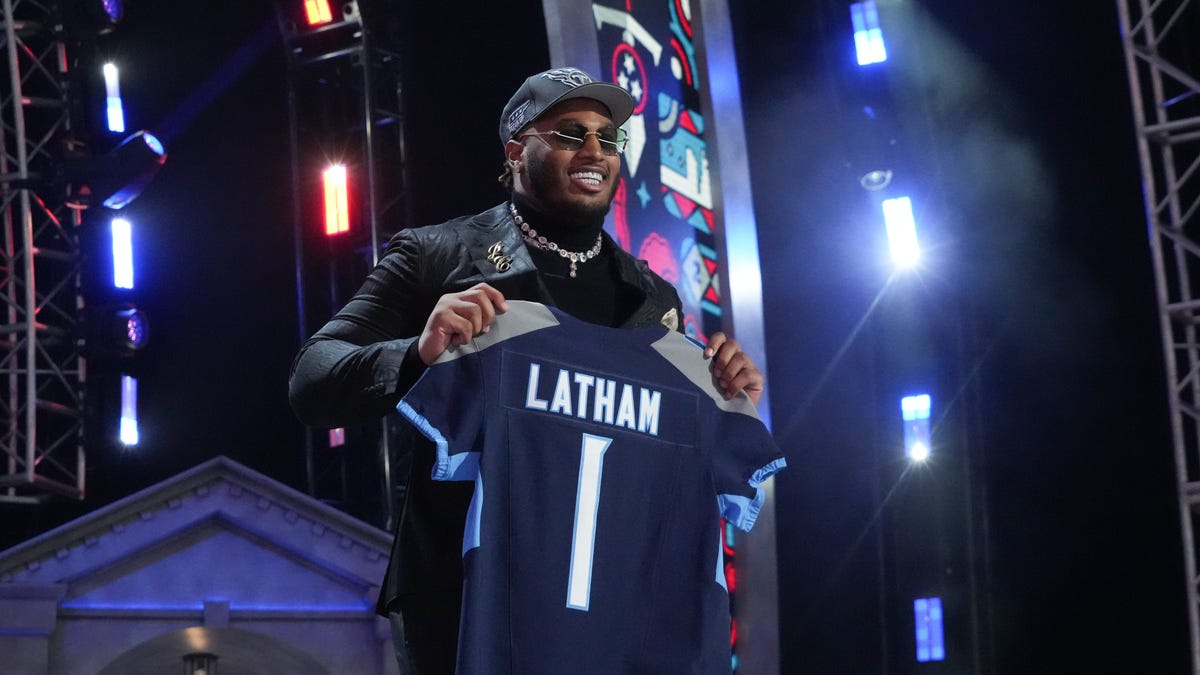
 Tennessee1 week ago
Tennessee1 week agoHow to buy JC Latham’s Tennessee Titans jersey after 2024 NFL Draft selection
-

 Politics1 week ago
Politics1 week agoColumbia University’s policy-making senate votes for resolution calling to investigate school’s leadership
-

 Politics6 days ago
Politics6 days agoHouse Republicans brace for spring legislative sprint with one less GOP vote
-
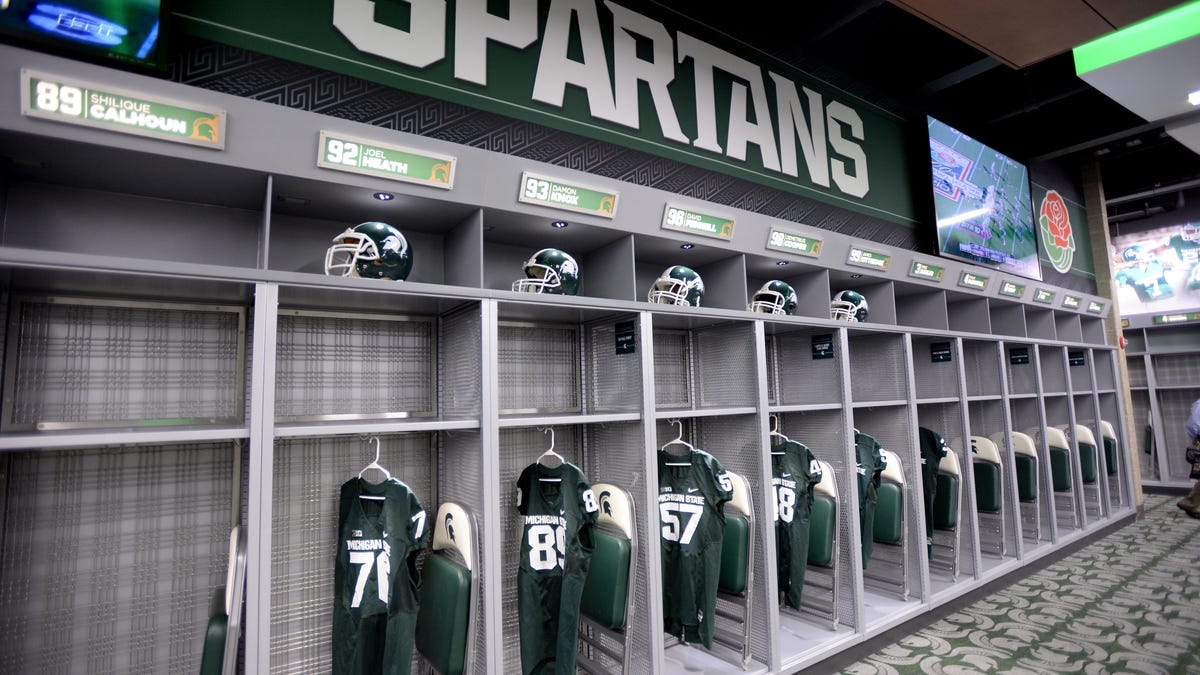
 Michigan1 week ago
Michigan1 week agoMichigan State football adds DT Brandon Lane from Stephen F. Austin
-

 News1 week ago
News1 week agoBoth sides prepare as Florida's six-week abortion ban is set to take effect Wednesday



/cdn.vox-cdn.com/uploads/chorus_asset/file/23951502/VRG_Illo_STK172_L_Normand_JackDorsey_Neutral.jpg)









